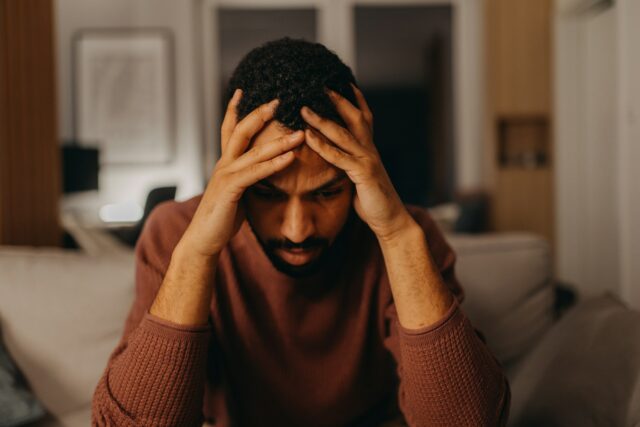Depression is misunderstood a lot, not just by people who’ve never experienced it, but even by those who have.

The misconceptions surrounding this mental health conception can add layers of shame, guilt, and frustration to what is already a major struggle. If you or someone you care about is battling this condition, it’s just as important to know what it doesn’t mean about the person experiencing it as it is to know what it does.
1. It doesn’t mean you’re weak.

Struggling with depression doesn’t reflect a lack of strength. In fact, facing each day while carrying that emotional weight requires incredible courage. Strength is not about being invincible; it’s about continuing to fight, even when everything feels heavy and impossible.
2. It doesn’t mean you’re lazy.

Depression can sap your energy, motivation, and ability to complete even basic tasks. This isn’t the same as being lazy. When your mind and body are weighed down by depression, getting through the day can feel like running a marathon. Doing your best, even if it seems small, is still an effort worth recognising.
3. It doesn’t mean you’re attention-seeking.

Talking about your depression or showing signs of struggle isn’t a ploy for attention. It’s a sign that you’re human and in need of support. People with depression often try to hide their pain, so when they do open up, it’s a brave act of honesty, not manipulation.
4. It doesn’t mean you’re broken.

Depression can make you feel like you’re shattered into pieces, but it doesn’t mean you’re fundamentally broken. You are still whole, even when you feel fragmented. Struggling with mental health doesn’t diminish your worth or your ability to heal and thrive.
5. It doesn’t mean you’re not trying hard enough.

Depression isn’t a matter of willpower. The idea that you can just “snap out of it” is a harmful misconception. Trying to cope with depression often takes tremendous effort, even if it’s not visible to anyone else. The fact that you’re still here shows you’re trying, and that matters.
6. It doesn’t mean you have nothing to be grateful for.

People often assume depression is about not appreciating what you have. But depression isn’t about ingratitude; it’s a mental health condition that can affect you regardless of your blessings. You can be grateful for your life and still struggle to feel joy or motivation.
7. It doesn’t mean you’re being dramatic.

Your feelings and struggles are valid, no matter how they’re seen by other people. Experiencing intense sadness, emptiness, or exhaustion isn’t about being dramatic. Minimising your pain or dismissing it as theatrics can prevent you from getting the help you need.
8. It doesn’t mean you’re a burden.

Depression can make you feel like you’re too much for the people around you, but that’s not true. Those who care about you want to support you. Your struggles don’t make you a burden; they make you someone who deserves compassion and understanding.
9. It doesn’t mean you’re incapable of love.

Depression might make it hard to express love, but it doesn’t mean you don’t feel it. Emotional numbness or withdrawal are symptoms, not reflections of your capacity to care. Your ability to love is still there, even if it feels hidden beneath the weight of depression.
10. It doesn’t mean you’ll always feel this way.

When you’re in the depths of depression, it can feel like it’s never going to end. But depression is not permanent, even if it feels that way in the moment. There is hope, and things can get better with time, support, and treatment. Your current feelings don’t define your entire future.
11. It doesn’t mean you’re selfish.

Focusing on your mental health and prioritising self-care isn’t selfish; it’s necessary. Depression can sometimes make it hard to show up for other people, but that doesn’t mean you’re self-absorbed. Taking care of yourself is the first step to being able to care for everyone else.
12. It doesn’t mean you lack faith or positivity.

Having depression doesn’t mean you lack faith, hope, or a positive outlook. Depression isn’t a choice or a mindset issue; it’s a complex mental health condition. You can be an optimist or a deeply faithful person and still experience depression.
13. It doesn’t mean you’re weak-minded.

Intelligence and mental strength have nothing to do with depression. It can affect anyone, regardless of their mental toughness, education, or resilience. Struggling with depression isn’t a reflection of your mental capability but rather a health condition that needs attention.
14. It doesn’t mean you’re failing at life.

Depression can make you feel like you’re falling behind or failing, but this is a distorted perception caused by the illness. Your worth isn’t measured by productivity or achievements. Surviving each day, even when it’s hard, is an accomplishment in itself.
15. It doesn’t mean you’re alone.

Depression can feel isolating, but you’re not alone in your struggle. Many people understand what you’re going through, and help is available. Reaching out might feel tough, but there are people who care and want to support you through this.




